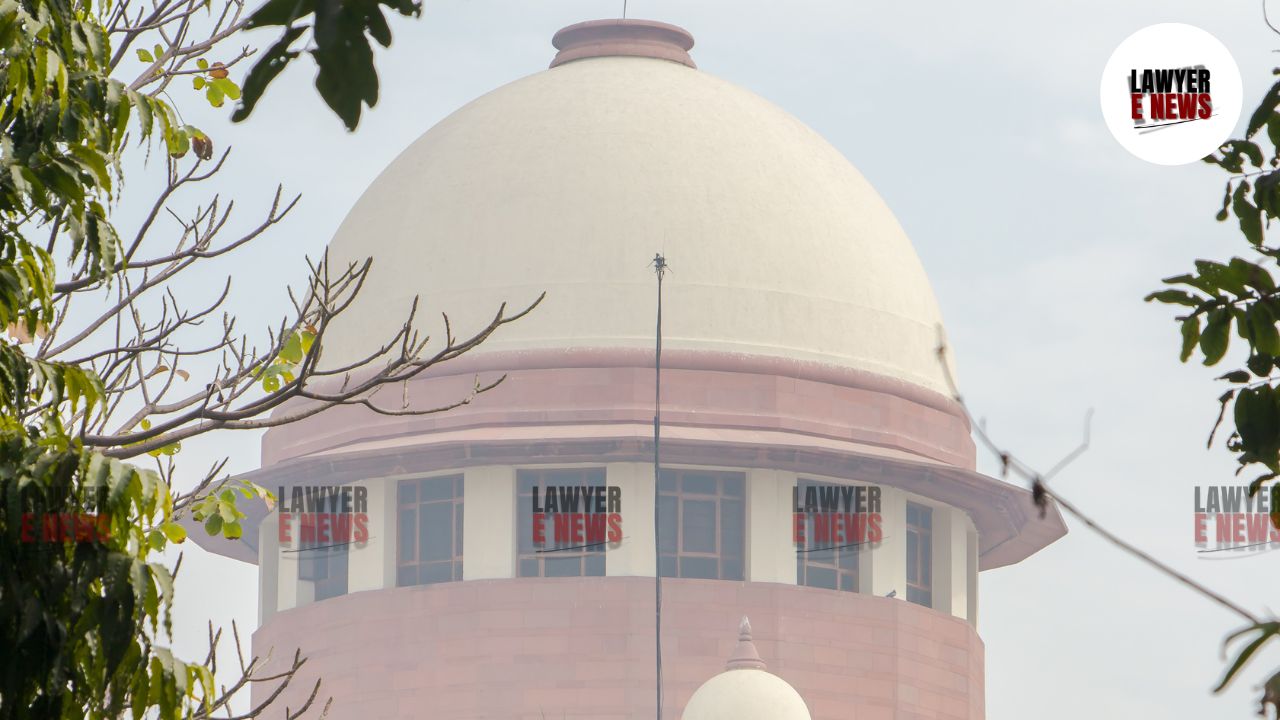-
by Admin
15 February 2026 5:35 AM



Supreme Court of India, in Laxmikant Tiwari v. Directorate of Enforcement, Criminal Appeal Nos. 4142 and 4143 of 2024, granted bail to two appellants held under the Prevention of Money Laundering Act, 2002 (PMLA). The Court highlighted that the appellants had been detained for prolonged periods without any scheduled offence being present at the time the PMLA complaint was initially filed, thereby violating their fundamental rights under Article 21 of the Constitution.
The case stemmed from an FIR registered on July 12, 2022, at Kadugodi Police Station in Bangalore, which included charges under Sections 186, 204, 353, and 120-B of the Indian Penal Code (IPC). However, none of these charges except Section 120-B could potentially be considered a scheduled offence under PMLA, and even Section 120-B alone did not qualify after the Supreme Court’s recent ruling in Pavana Dibbur v. Directorate of Enforcement, which held that conspiracy charges under Section 120-B must be linked to a scheduled offence to trigger PMLA.
Following the FIR, the Enforcement Directorate (ED) registered an Enforcement Case Information Report (ECIR) and subsequently filed a PMLA complaint under Section 44. The sequence of events is as follows:
July 12, 2022: Initial FIR filed, but without a scheduled offence.
June 8, 2023: ED filed a charge-sheet that also lacked a scheduled offence.
January 17, 2024: An additional FIR was registered in Chhattisgarh with an allegation of extortion under Section 384 IPC—a scheduled offence under PMLA—marking the first time a scheduled offence was introduced in the case, nearly 18 months after the original FIR.
By this time, the appellants had been in custody for nearly two years and one year nine months, respectively, without a valid scheduled offence forming the basis of their detention under PMLA.
Key Legal Issues Examined
Validity of PMLA Proceedings in the Absence of a Scheduled Offence:
The Court examined whether the ED’s complaint under PMLA could be sustained in the absence of a scheduled offence at the time of its filing. According to PMLA requirements, prosecution under the Act must be based on an identifiable scheduled offence.
Fundamental Right to Liberty under Article 21:
The Court scrutinized whether the prolonged incarceration of the appellants without a scheduled offence in place violated their right to personal liberty under Article 21 of the Constitution.
The Supreme Court pointed out that for a PMLA prosecution to be valid, there must be an existing scheduled offence at the time of filing the complaint. When the ED filed its complaint under PMLA, none of the charges in the FIR qualified as scheduled offences. It was only much later, with the filing of a second FIR in Chhattisgarh, that a scheduled offence (extortion under Section 384 IPC) was introduced.
"On the date of filing of the charge-sheet, there was no scheduled offence. Continued detention based on a complaint filed without a scheduled offence cannot be justified," the Court observed.
The Court referenced its earlier ruling in Pavana Dibbur v. Directorate of Enforcement, which clarified that charges of conspiracy (Section 120-B IPC) alone are insufficient under PMLA unless connected to an actual scheduled offence.
The Court emphasized that the prolonged detention of the appellants, in the absence of any scheduled offence at the time of the PMLA complaint, amounted to a violation of their fundamental right to liberty under Article 21 of the Constitution. The Court noted that the appellants had already been in custody for substantial periods—nearly two years in one case and almost two years in the other—without the legal basis required to justify such detention under PMLA.
"Considering the long period of incarceration and the absence of a scheduled offence at the time of filing, the continuation of custody violates the appellants' rights under Article 21," the Court stated.
The Court made it clear that its observations were solely for the purpose of deciding the bail applications and would not influence the merits of the PMLA proceedings. The Court’s decision to grant bail was based on the specific circumstances of prolonged detention without a scheduled offence, rather than any assessment of guilt or innocence in the underlying PMLA case.
Decision
The Supreme Court allowed the appeals and directed the Special Court to release the appellants on bail with appropriate conditions after hearing the Enforcement Directorate. It underscored that the observations in this order were strictly for bail purposes and should not affect the outcome of the ongoing PMLA case on its merits.
This ruling reinforces the requirement of a scheduled offence for PMLA prosecutions and sets a precedent on the rights of detainees under Article 21 in PMLA cases. By granting bail due to the lack of a scheduled offence, the Supreme Court has emphasized that procedural safeguards under PMLA must be observed strictly, and prolonged incarceration without legal justification is unacceptable.
Date of Decision: October 4, 2024
Laxmikant Tiwari vs Directorate of Enforcement
